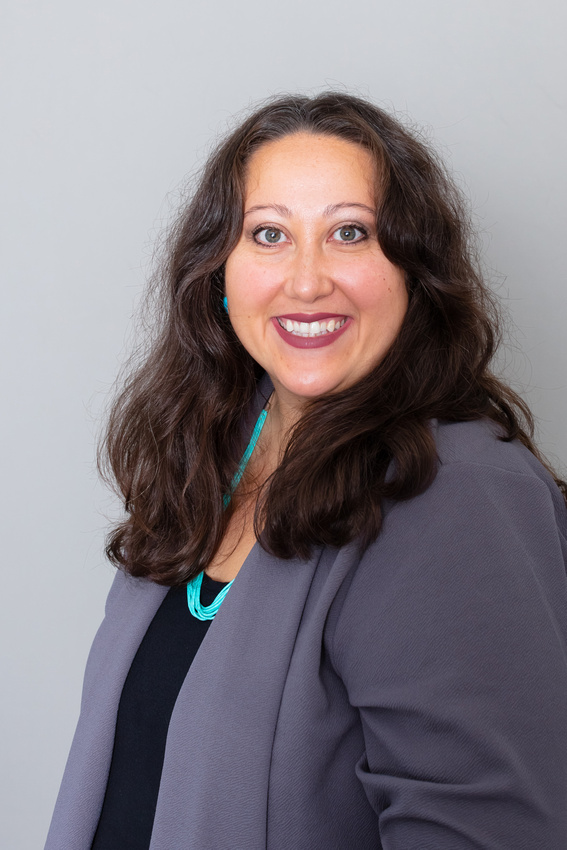
Dr. Kendra Abel, assistant professor, School of Education
Faculty Voices: Dr. Kendra Abel
Written By: Ian Silvester
Educating educators is what Dr. Kendra Abel, assistant professor of elementary, middle level, and secondary education, takes pride in at the University of Arkansas – Fort Smith. However, her journey
to this role was anything but ordinary.
“I did not have the traditional route to becoming an educator. I didn’t have the undergraduate
courses, the bachelor’s degree in education, but I had the heart and willingness to
do whatever it took,” said Abel with a grin.
The Stigler, Oklahoma, native graduated from Stigler High School not only as a proud
Panther but as a Gates Millennium Scholar (GMS) with a future wide open. Abel chose
to stay close to home, the GMS program providing an opportunity for her, as a member
of the Choctaw Nation, to receive significant financial aid to attend and graduate
from the University of Oklahoma with a Bachelor of Fine Arts with an emphasis in studio
art.
But her education didn’t stop there.
“I applied to a few different programs and even an art education program at Harvard
because that had been a lifelong dream to have a degree from an Ivy League school,”
Abel recalled. And to her astonishment, Harvard accepted her.
Abel had been accepted into the art therapy master’s program at Florida State University,
and she deferred that to move to Massachusetts for the one-year Master of Education
program at Harvard. From there, her path toward education began to take shape.
After attending Harvard, Abel’s love of teaching blossomed, and a move to Tallahassee
for art therapy, she says, didn’t feel quite right. So, she returned home and applied
for the doctoral program at OU in Educational Studies to continue where she left off
after leaving Harvard.
She completed her required coursework and applied to Teach for America – a prestigious
nonprofit organization, that accepts fewer than 15 percent of applicants, with a commitment
to helping students in communities that lack resources and schools that are not equipped
to meet the needs of all children.
“I taught summer school and created lesson plans and got feedback in real-time,” said
Abel. “I was able to develop my skills as an educator in my pursuit of ensuring all
students had access to a high-quality education.”
Combining her two passions, art and teaching, Abel became a K-12 art educator throughout
Oklahoma. Additionally, she taught art appreciation online as an Oklahoma City Community
College adjunct instructor. Little did she know that would prepare her for the effects
of a virus that spread around the globe.
Abel was already a seasoned online teacher when the COVID-19 pandemic altered the
traditional classroom landscape. She was able to use this time to retool her curriculum
for the 2020-2021 academic year and prepare not only her students but herself for
a safe return to the classroom.
“In 2017, I was diagnosed with a one-inch hole in my heart,” she explained. Doctors
could close the hole by inserting a mesh device, but this wasn’t the only underlying
health factor for Abel.
Born with Holt-Oram syndrome, a disorder that causes bone abnormalities in the arms
and hands and often leads to heart problems. Not one to let it hold her back, Abel
calls it “being differently abled,” which has led to a lifetime of finding ways to
adapt.
Abel says she is proud of how she adapted to teaching art online while working for
the community college and how that prepared her to do the same with her K-12 students
amid the pandemic. Her resilient adaptability led Abel to UAFS in August of 2021.
As a Choctaw citizen, Abel has connected to more Indigenous students through the Native
American Student Association and in the classroom at UAFS.
“I always try to tell them it’s not too late to invest in their culture and identity,”
Abel said proudly. “It’s something I always try to support.”
UAFS has given Abel more opportunities to share that support of Indigenous people
back home. “Thinking about rural communities in Oklahoma, especially those who may
be underserved in having that representation of teachers to meet the same demographic
of students is important to me. It’s one of the pursuits I’ll eventually take on,”
said Abel.
Being a Choctaw educator is something that also connects Abel to her family. Her father
worked 40 years for the Oklahoma Department of Corrections, even spending some of
that time teaching bachelor-level courses to prisoners, and it has become a new passion
for Abel to share the stories of Choctaw elders who were previously educators.
“How you support the next generation is incredibly important,” she said. “One of my
native beliefs is seven generations: What do you do today, and how is that action
going to impact seven generations in the future? It’s that ripple effect to shape
hundreds of lives that makes me want to give my best at all times.”
- Tags:
- College of Health Education and Human Sciences
- Education
- School of Education
- Faculty
- Elementary and Middle Level Education
